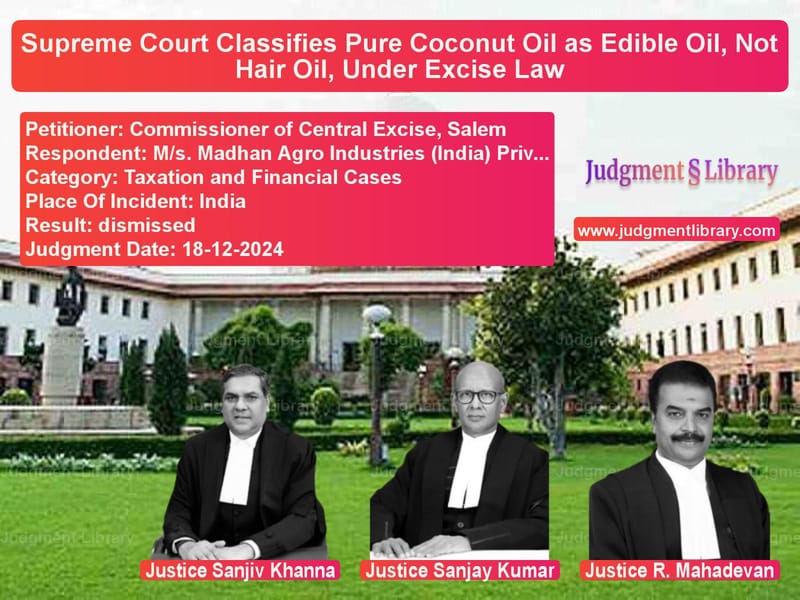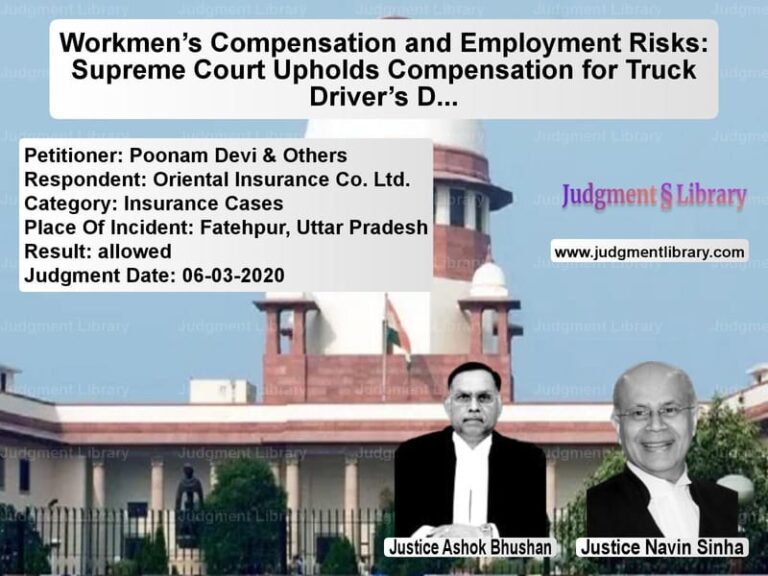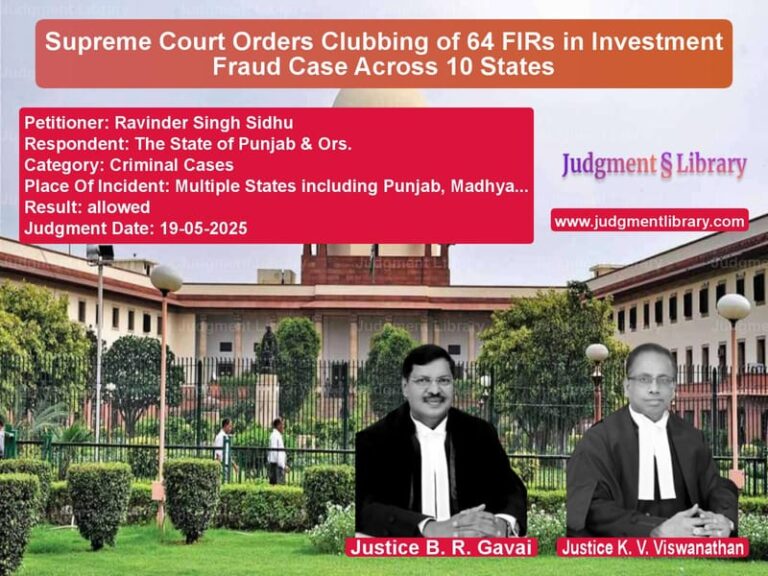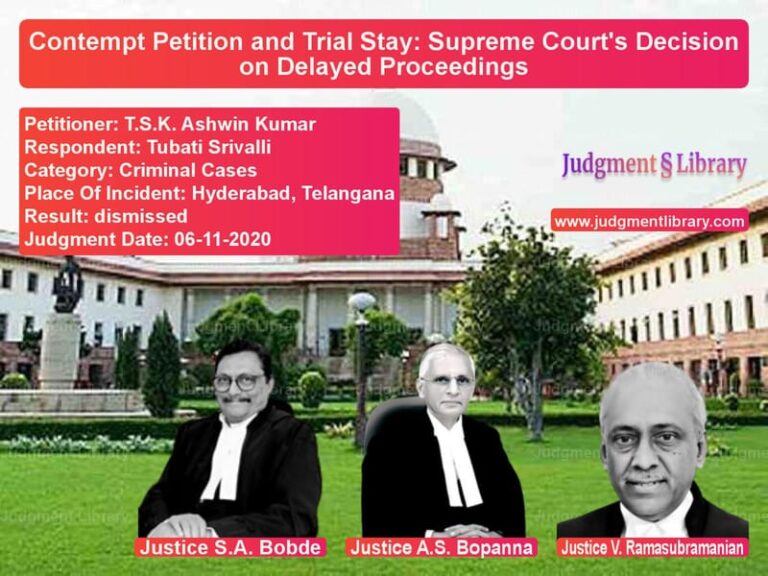Supreme Court Classifies Pure Coconut Oil as Edible Oil, Not Hair Oil, Under Excise Law
The Supreme Court of India, in the case of Commissioner of Central Excise, Salem vs. M/s. Madhan Agro Industries (India) Private Ltd., addressed the long-standing dispute regarding the classification of coconut oil for excise duty purposes. The ruling, delivered by Chief Justice Sanjiv Khanna, Sanjay Kumar, and R. Mahadevan, upheld that pure coconut oil, even when packaged in small quantities, should be classified as ‘edible oil’ under Heading 1513 of the Central Excise Tariff Act, 1985 unless explicitly marketed as a cosmetic or hair product.
Background of the Case
The appeals arose from conflicting judicial interpretations on whether coconut oil, sold in small retail packages, should be classified under:
- Heading 1513: ‘Coconut (Copra) Oil’ under Section III, Chapter 15 of the Excise Tariff Act, treated as edible oil.
- Heading 3305: ‘Preparations for use on the hair’ under Section VI, Chapter 33, classified as a cosmetic preparation.
The dispute was significant as it impacted excise duty liabilities amounting to over ₹159 crore, with the Central Board of Indirect Taxes and Customs (CBIC) stating that similar cases were pending across various forums.
Legal Issues Considered
- Does the classification of coconut oil depend solely on packaging size?
- Should coconut oil in smaller retail packs automatically be treated as hair oil?
- How should excise classifications align with the Harmonized System of Nomenclature (HSN) used internationally?
Petitioner’s Arguments (Excise Department)
The Revenue Department contended that:
- When coconut oil is sold in small packs (5 ml to 200 ml), consumers generally purchase it for use as hair oil.
- Excise duty should be imposed based on common usage rather than the composition of the oil.
- Advertising and branding elements, such as images of people with long hair on packaging, indicate the product’s intended use as hair oil.
- Under the ‘common parlance test,’ if a product is generally used as hair oil, it should be taxed accordingly.
Respondent’s Arguments (M/s. Madhan Agro Industries & Others)
The manufacturers argued:
- Pure coconut oil is a versatile product used both as an edible oil and for cosmetic purposes.
- Excise classification should follow HSN standards, which do not differentiate based on packaging size.
- The Food Safety and Standards Act (FSSA), 2006, governs edible oil regulations, and their product met all the requirements for edible-grade coconut oil.
- The mere fact that some consumers use coconut oil for hair care does not make it a cosmetic product.
Supreme Court’s Analysis and Findings
Classification Based on HSN Standards
The Court referred to the Harmonized System of Nomenclature (HSN) and observed:
“Coconut oil, when unmodified, is classified under Heading 1513. The use of a product for multiple purposes does not change its fundamental classification.”
The Court emphasized that under international classification norms, coconut oil remains an edible oil unless specific modifications or marketing claims indicate otherwise.
Rejection of the Common Parlance Test
The Court rejected the ‘common parlance test’ in this context, noting:
“A product cannot be reclassified solely based on its common usage. When a statutory heading explicitly covers a product, its classification must align with legal definitions rather than general perceptions.”
The Court found that coconut oil does not undergo any process that converts it into a cosmetic or hair preparation and that merely selling it in small packs does not change its essential character.
Legislative Intent and Previous Excise Circulars
The Court reviewed past excise notifications:
- The 1995 Excise Circular had initially clarified that coconut oil was an edible oil, even in small packs.
- The 2009 Excise Circular attempted to classify all small packs as hair oil but was later withdrawn in 2015 due to contradictions in enforcement.
The Court held:
“Once the excise classification aligns with international HSN standards, circulars issued by revenue authorities cannot override statutory provisions.”
Relevance of Packaging and Labelling
The Court established that for coconut oil to be classified as hair oil under Heading 3305:
- The packaging must explicitly mention ‘hair oil.’
- It must contain additives, perfumes, or ingredients that distinguish it from pure coconut oil.
- The branding must indicate cosmetic or medicinal benefits beyond its natural properties.
Since Madhan Agro’s packaging met none of these criteria, the Court ruled in favor of classifying it as edible oil.
Final Verdict
The Supreme Court dismissed the appeals filed by the Excise Department, ruling:
- Coconut oil, regardless of packaging size, is classified under Heading 1513 as ‘Edible Oil.’
- It can only be classified under Heading 3305 (‘Hair Oil’) if it contains additives or is explicitly marketed for cosmetic use.
- The excise duty demands on Madhan Agro Industries and Marico Ltd. were quashed.
Impact of the Judgment
This ruling has significant implications:
- Manufacturers of coconut oil can continue to classify their products as edible oil if they comply with food-grade regulations.
- Customs and excise authorities cannot arbitrarily reclassify products based on perceived consumer usage.
- The ruling prevents unnecessary tax burdens on businesses selling unmodified coconut oil.
- It provides clarity for the industry on how excise duty classifications align with international trade standards.
The judgment reinforces the principle that classification of goods should be based on statutory definitions rather than consumer assumptions, ensuring greater consistency in tax administration.
Petitioner Name: Commissioner of Central Excise, Salem.Respondent Name: M/s. Madhan Agro Industries (India) Private Ltd..Judgment By: Justice Sanjiv Khanna, Justice Sanjay Kumar, Justice R. Mahadevan.Place Of Incident: India.Judgment Date: 18-12-2024.
Don’t miss out on the full details! Download the complete judgment in PDF format below and gain valuable insights instantly!
Download Judgment: commissioner-of-cent-vs-ms.-madhan-agro-ind-supreme-court-of-india-judgment-dated-18-12-2024.pdf
Directly Download Judgment: Directly download this Judgment
See all petitions in Tax Refund Disputes
See all petitions in Customs and Excise
See all petitions in Banking Regulations
See all petitions in GST Law
See all petitions in Judgment by Sanjiv Khanna
See all petitions in Judgment by Sanjay Kumar
See all petitions in Judgment by R. Mahadevan
See all petitions in dismissed
See all petitions in supreme court of India judgments December 2024
See all petitions in 2024 judgments
See all posts in Taxation and Financial Cases Category
See all allowed petitions in Taxation and Financial Cases Category
See all Dismissed petitions in Taxation and Financial Cases Category
See all partially allowed petitions in Taxation and Financial Cases Category







